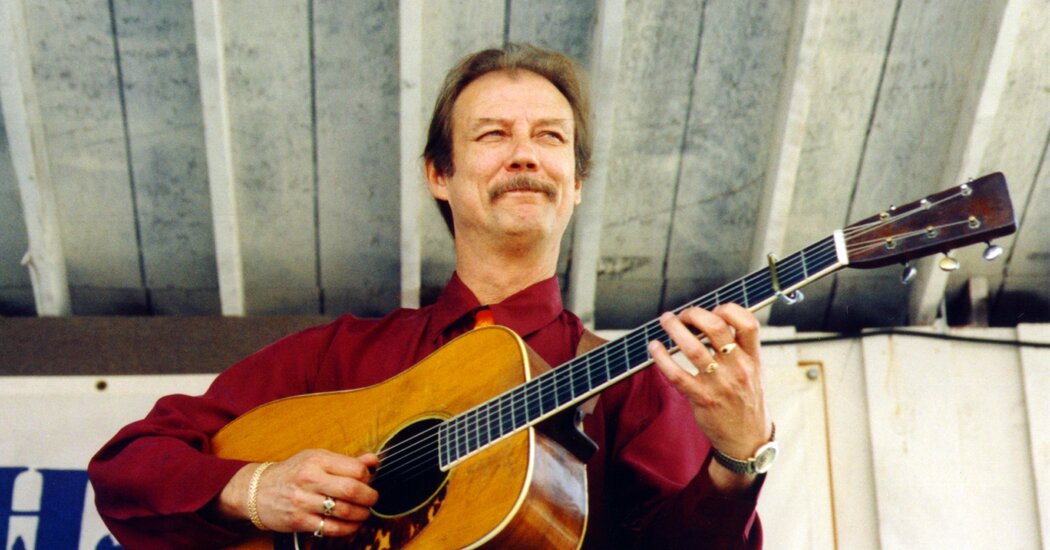Tony Rice, a singer and guitarist hugely influential in bluegrass music and in the new vocal music circles that was growing up around it, died Saturday at his home in Redsville, North Carolina at the age of 69.
The International Bluegrass Music Association confirmed his death. No reason was specified.
“Tony Rice was the king of flat guitar,” singer-songwriter Jason Esbel He said on Twitter. „Its impact cannot be overstated.“
Mr. Ispel was referring to what is commonly known as flat piercing, a technique that involves striking guitar strings with a pluck or plectrum rather than with fingers. Inspired by the robust decoration of bluegrass major leader Jimmy Martin, Mr. Rice’s selection was a clever and uniquely expressive flat.
“I don’t know if anyone could do something more beautiful,” Mr. Ispel went on to say in his tweet, describing Mr. Rice’s bad and percussive play, where the feeling, whether expressed rhythmically or tune, takes precedence over the flash.
Mr. Rice has left his mark on a host of prominent musicians, including fellow innovators Mark O’Connor and Bella Flick, vocal music legacies such as Chris Till and Alison Krause, and distinguished students Brian Sutton and Josh Williams.
„There’s no way you can get back to how it was before,“ Ms. Krause said of Bluegrass in an interview with The New York Times magazine for a profile on Mr. Rice in 2014. She was barely a teenager when he was mr. Rice first invited her on stage to play with him.
He started in the 1970s with his group business J.D. Crowe and the New SouthMr. Rice built bridges that spanned traditional bluegrass, 1960s folk songs, jazz improvisation, classical music, singer-songwriter.
He was a catalyst for the Newgrass movement, as bands broke with bluegrass traditions by relying on pop and rock sources for inspiration, and used a more improvisational approach in performing and incorporating previously untapped instruments such as electric guitar and drums.
The Bluegrass Association named him the Most Effective Performance of the Year six times, and in 1983 he won a Grammy Award for Best Country Musical Performance for „Fireball,“ a track recorded with JD Crowe and New South.
Not only was Mr. Rice a talented guitarist, but he was also a talented singer and drafting professor. His rich, floppy baritone was equal to home singing in his three-part bluegrass harmony arrangements as he adapted Troubadour Gordon Lightfoot Songs Under the banner of New Grass.
But his performing career was suddenly interrupted in 1994, when he learned that he was suffering from dystonia, a severe vocal disorder that robbed him of the ability to sing in public and weakened his speaking voice. He wasn’t singing on stage or addressing an audience again until 2013, when the Blue Grass Society inducted him into the International Bluegrass Hall of Fame.
Shortly after this diagnosis, Mr. Rice learned that he also suffers from lateral epicondylitis, known as tennis elbow, which made playing guitar in public also extremely painful for him.
David Anthony Rice was born on June 8, 1951 in Danville, Virginia, and is one of four boys from Herbert Hoover Rice and Dorothy (Poindexter) Rice, better known as Louise. His father was an amateur welder and musician, and his mother was a mill worker and housewife. Her idea was to call her son Tony, after her favorite actor, Tony Curtis. Everyone in Rice’s household played or sang bluegrass music.
After the family moved to the Los Angeles area in the mid-1950s, Mr. Rice’s father formed a Bluegrass band called the Golden State Boys. The group, which recorded several singles, included two of his mother’s siblings as well as young Del McCurry at one point, before he became a master of bluegrass in his own right. The band inspired Mr. Rice and his brothers to form their own bluegrass community, the Huffazards.
The Heavazards sometimes shared the local bills with Kentucky Colonels, a band that dazzling guitarist, Clarence White – a future member of the rock band Birds – had a profound influence on Mr. Rice’s early development as a musician.
(Mr. White was killed by a drunk driver while loading equipment after a show in 1973. Then, Mr. Rice tracked down Mr. White’s 1935 Martin D-28 herringbone guitar, which he bought from its new owner in 1975 for $ 550. “ Playing the guitar, calling it „antique.“)
The Rice family moved from California to Florida in 1965 and then to various cities in the southeast, where Mr. Rice’s father pursued the welding opportunity one by one.
He was also drinking, creating a turbulent home life that forced Mr. Rice to leave when he was seventeen years old. Tony Rice was drinking alcohol himself but, according to his account, he’s been vigilant since 2001.
After dropping out of high school, Mr. Rice bounced between relatives‘ homes before moving to Louisville in 1970 to join the Bluegrass Alliance. Band members, including mandolin bassist Sam Bush, went on to form much of the founding core of the progressive bluegrass band New Grass Revival.
Mr. Rice joined JD Crowe and New South in 1971. Three years later, Mr. Skaggs also signed, replacing Mr. Rice’s brother Larry on the group. Dubro player Jerry Douglas also became a member of the New South at this time. In 1975, the band released an album, Simply titled JD Crowe and the New South (But it’s generally known for its first track, „Old Home Place“), which modernized bluegrass in ways that shaped music in the 21st century.
Mr. Rice, Mr. Douglas and Mr. Skaggs left the group in August 1975. Mr. Rice then moved to San Francisco and helped found the David Griezmann Quartet, a pioneering band featuring bluegrass equipment that combined classic sensibilities and jazz music to create what the master says. Greasman called „Doug’s music“.
Mr. Rice told The Times in 2014, „The music set in front of me wasn’t like anything I’ve seen before. At first I thought I couldn’t learn it. The only thing that saved me was that I always liked the sound of jazz vocal and the small and modern group.“
After four years with Mr. Greasman, Mr. Rice established his own group, Tony Rice unit, Which has been praised for its experimental, steeped, experimental approach to bluegrass jazz as heard on albums such as Manzanita (1979) and „Mar West“ (1980).
Mr. Rice also recorded more mainstream and traditional material for several other projects, including a six-volume series of albums that paid tribute to formative Bluegrass in the 1950s.
„Skaggs & Rice“ (1980), another history-loving album in which Mr. Skaggs and Mr. Rice sing a smooth, emotional harmony in honor of the predominant fraternal duo of the pre-bluegrass era.
Most of Mr. Rice’s releases after 1994, the year he was diagnosed with a voice disorder, were useful projects or collaborations, such as „The Pizza Tapes,“ a studio album with Mr. Grisman and Jerry Garcia from Grateful Dead fame; Mr. Rice contributed acoustic guitar.
Among his survivors are his 30-year-old wife, Pamela Hodges Rice, and his brothers Ron Wyatt. His brother Larry passed away in 2006.
Mr. Rice cuts a shattered onstage figure, complete with meticulously tailored suits and gracious bearings, as if to refuse the occasional disrespect of bluegrass outside the South, due to its tough country beginnings.
Mr. Rice was aware of these cultural dynamics as much as he was aware of the limitless possibilities he saw in bluegrass music.
„Maybe the reason I’m dressed like me is because, if you go out on the street, unless you have some kind of trenching job, I put in an effort so it doesn’t look like saliva,“ his biographer Tim Stafford and Caroline Wright told of what Still Inside: The Tony Rice Story „(2010).
„Going back to the heyday of Miles Davis‘ most famous band, you wouldn’t see Miles without wearing a tailored suit.“ „My musical heroes are wearing suits.“

Obecný hudební guru. Vášnivý myslitel. Milovník popkultury. Vášnivý fanoušek zombie.


